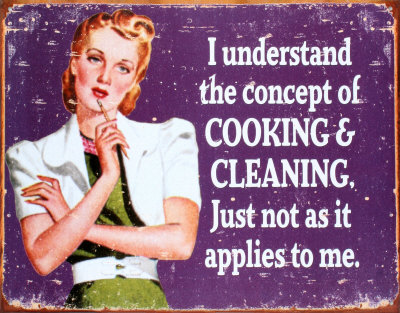February 13, 2011
On Food and (not) Cooking
Anyone can cook, and most everyone should.
Mark Bittman begins the aptly named How to Cook Everything with this declaration. What follows, is a massive tome of instructions intended to prove the point, to walk even the most nubile kitchen visitor through baking a potato or boiling water; there are advanced techniques too, and recipes that will impress even that friend who fancies himself a foodie by virtue of his Food Network viewing habits.
I know this, because I read cookbooks at work. At least, I browse most of them. I have a fascination with food, and to an extent, with the preparation thereof. But that fascination ends somewhere between the eating and the cooking. The former, I will do with relish, the latter, mostly not at all.
The only vital kitchen apparatus is the microwave, for making oatmeal, frozen dinners/burritos, and "steaming" rice and vegetables. Everything else can be tossed in un or pre cooked, or else it can be avoided altogether. Dress the whole pile up with too much siracha, salsa, mustard, or other strongly flavored condiment, and you've got something I've grown to find palatable.
Thus it isn't the first half of Bittman's pithy quote that I fail to achieve; I don't doubt that I can cook. But should I? It's a question that evokes an almost automatic yes. One who cooks can eat healthier, we're told. That person will also save money. Perhaps most of all, said person will eat better, and be more satisfied. We're told those things so often that they must be true, or else people would surely stop saying them. There isn't wisdom in numbers; there is certitude, however.
Of course, this is a false dichotomy, if what I'm doing counts as cooking, which I would argue that it does, technically. To cook something is merely to prepare it for eating by use of heat, which I do. Perhaps one could say, more accurately, that I'm thawing more than cooking. But whatever the case, I am consuming food, in my home, with control over the ingredients and portions.
Which brings me to that first argument, that one who cooks eats healthier. There are studies that show abysmal health metrics for those who eat out routinely. But those people are visiting fast food restaurants, by in large, and the studies don't account for their caloric intake, or even the general makeup of those calories. Which is not to say that higher end dining is less potentially damaging to the waistline, bite for bite. Rare is the delicious restaurant dish that hasn't been sweetened with more sugar than you'd dare use for a dessert, or fried in more oil than BP spilled in the gulf. These things are good, not always because of some sublime technique exhibited by the couldn't-care-less line cook, but because they appeal to the primal desire for sugar, salt, and fat.
More appropriately, one might say, Anyone can eat at home, and most everyone should. Having an Amy's rice bowl and cup of Fage greek yogurt for dinner is not cooking, but find me a tangible metric which says the pair don't form a healthy meal. And it is not expensive, nor is it any less satisfying to the stomach or the mind. Anyone can eat healthy, and most everyone should. Anyone can eat good food, and most everyone should. But let's leave the cooking to those who like it. I like making coffee, and running in sub freezing temperatures for several miles, wearing shorts and a sleeveless shirt. I think those things are good, because they are good for me. I also think that others could probably, on some level, derive benefit from them. But should everyone drink coffee? Should everyone run? No.
Anyone can find activities they like, and most everyone should.
Now, if you'll excuse me, I'm off to cook something from a Mark Bittman book -- seriously.
Labels:
cooking
Subscribe to:
Post Comments (Atom)


No comments:
Post a Comment